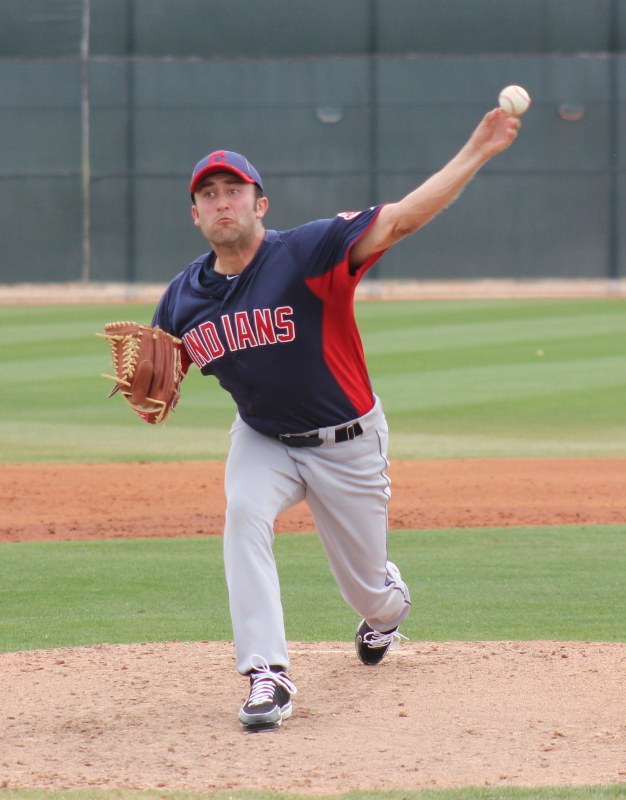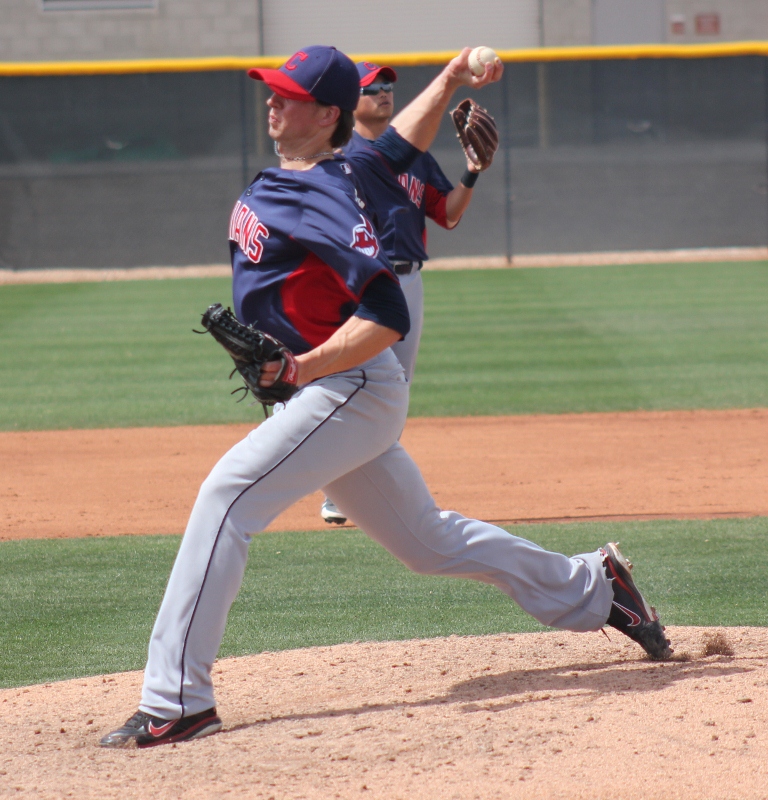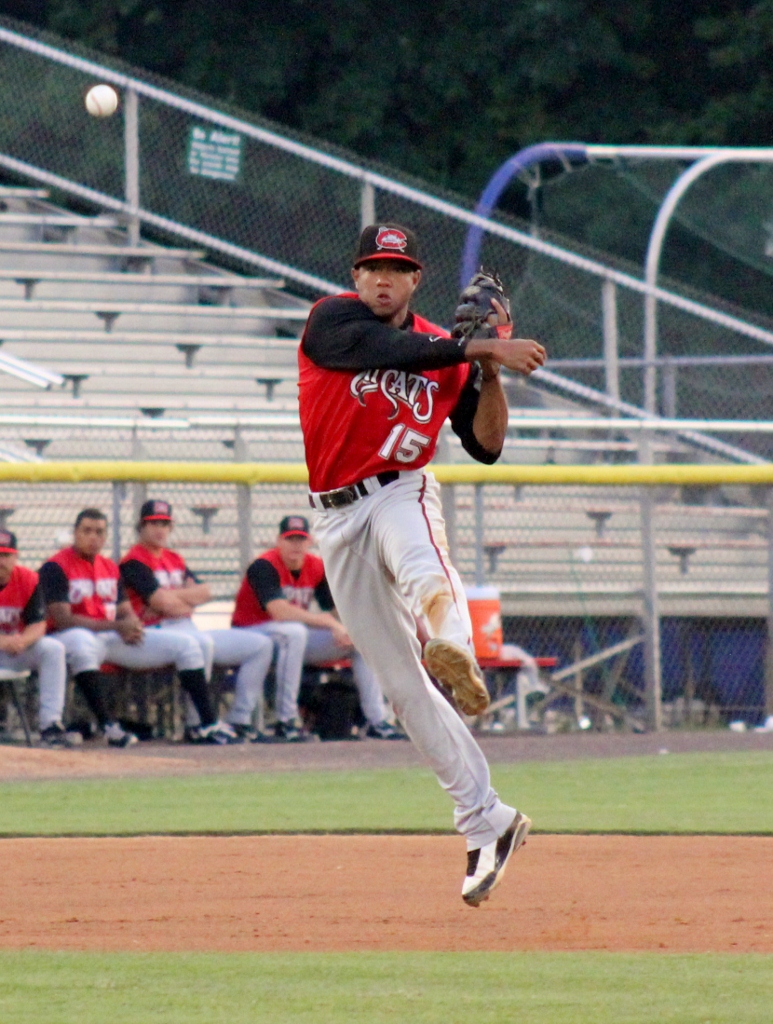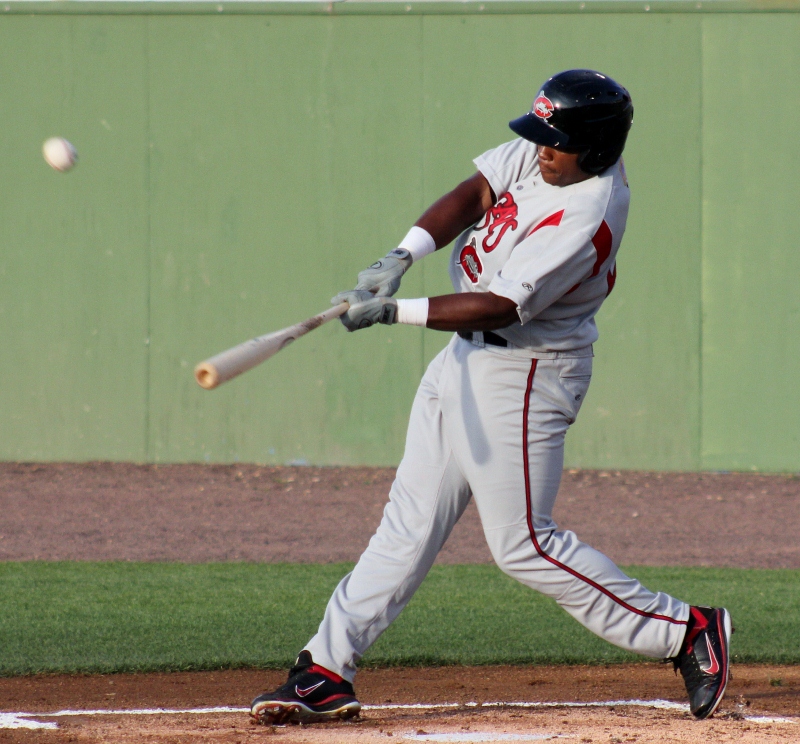 Indians Archive
Indians Archive  Arizona Fall League Preview
Arizona Fall League Preview

The Arizona Fall League opened play yesterday as action got underway in what is universally regarded as MLB’s premiere offseason showcase for top prospects across baseball. The Indians sent eight kids down to the desert, split evenly between pitchers and position players. The Tribe farmhands will join those from the Los Angeles Angels, New York Yankees, Pittsburgh Pirates and San Francisco Giants to comprise the Scottsdale Scorpions this fall, who will play their home games in San Francisco’s spring training facility located in lovely Scottsdale, Arizona. An informal survey of the Indians prospects found that 117% of them favor living/working in Scottsdale over Goodyear, and those who’ve been to both areas will have a pretty good idea why. Columbus Clippers hitting coach Phil Clark will be accompanying the players as part of the Scottsdale coaching staff. The Indians sent an interesting contingent of players to Arizona this year, including the two youngest players on the Scorpions roster. Here’s a look at who’s in the desert and what we can expect out of them, both this fall and going forward through the system:
T.J. House, LHP: Each organization is allowed to designate one of their pitchers as a starter, and the AFL managers can only use those players in the starting rotation. House is the Indians designated starter this year, and the lefty is hoping to have a similar campaign as his predecessors the past two years, fellow southpaws Scott Barnes (2010) and T.J. McFarland (2011). Both Barnes and McFarland had solid seasons in the hitter-friendly environment down in the desert, and House should be able to do the same. He began the season with high-A Carolina, going 2-0 with a 1.44 ERA while striking out 26 and walking just 6 in 25 IP for the Mudcats. Quickly promoted to the more challenging environment of AA Akron, House continued to put together a solid season. He went 8-5 with a 3.98 ERA, 90 K and 44 BB in 124 1/3 IP for the Aeros, and was really one of the better starting pitchers in the organization this season. He was criminally underrated on my preseason top prospects countdown at #49, a fact I’m both slightly ashamed of and extremely happy about being so wrong. House reported to spring training in much better shape in 2012, and also changed his arm slot from an over-the-top angle to a more ¾ delivery similar to how he through as a prepster. Those factors combined to propel House to his best season as a professional, and there’s no reason to think his success won’t carry over to Arizona this fall. House turned 23 just a couple of weeks ago, and has a profiles as a solid middle of the rotation starter who pitches to contact, keeps the ball in the ballpark and eats innings in a major league rotation.
Matt Packer, LHP: Packer, a 32nd round pick out of the University of Virginia in 2009, was one of the more pleasant surprises in the system in 2010. Packer put up a 9-7 record with a 2.04 ERA between Lake County and Akron that year, striking out 123 and walking just 22 in 132 2/3 IP. He took a small step back in 2011, pitching the entire year at AA Akron and going 9-12 with a 4.31 ERA, 129 K and 33 BB in 169 1/3 IP. Still, Packer was expected to spend a significant amount of time in Columbus this season, but sprained his rotator cuff in spring training this year and didn’t pitch in game action until July. He made a total of 14 starts between the rookie-level AZL Indians, Carolina, Akron and Columbus. Six of his starts were for the AAA Clippers, where he went 1-4 with a 5.50 ERA, 23 K and 14 BB in 34 1/3 IP. Packer has always been more of a command and control guy who does a nice job going after hitters. Not having a spring training really undercut both his effectiveness and any momentum he had built up with a strong 2nd half of the 2011 season, and is really just looking to make up for lost time down in Arizona.
 Trey Haley, RHP: Haley is everything you could want in a power bullpen arm. The 6’3”, 180lb righty out of Nacogdoches, TX just looks like a pitcher. He has an arm capable of generating triple-digit heat, and he maintains high-90’s velocity with surprising consistency. He also has a nice curveball that flashes plus, a big-breaker that is almost 20 MPH slower than his plus-plus heat. It’s a great pitch to change up both the velocity and the eye level on hitters, and makes his fastball that much more effective. Haley went a combined 4-1 with a 2.33 ERA and a 11.4 K/9 ratio between three levels last season. The only concerns with Haley are his command (4.4 BB/9) and his health, as Haley was able to throw just 38 2/3 innings in 2012 after being limited to 44 1/3 innings in 2011 with a sports hernia. Haley was a starter through 2010, but the decision was made to move him to the bullpen prior to the 2011 season. The lack of a reliable 3rd pitch played a major role in that decision, although Haley has added a slider to his repertoire that he feels increasingly comfortable with. He’s an ideal arm to have in the back end of a bullpen though, as he has the ability to come in and just blow hitters away with his fastball towards the end of the game. Like Packer, Haley will be logging some innings to make up for time lost to injury in 2012, and should be one of the top RP on the Scottsdale roster this fall.
Trey Haley, RHP: Haley is everything you could want in a power bullpen arm. The 6’3”, 180lb righty out of Nacogdoches, TX just looks like a pitcher. He has an arm capable of generating triple-digit heat, and he maintains high-90’s velocity with surprising consistency. He also has a nice curveball that flashes plus, a big-breaker that is almost 20 MPH slower than his plus-plus heat. It’s a great pitch to change up both the velocity and the eye level on hitters, and makes his fastball that much more effective. Haley went a combined 4-1 with a 2.33 ERA and a 11.4 K/9 ratio between three levels last season. The only concerns with Haley are his command (4.4 BB/9) and his health, as Haley was able to throw just 38 2/3 innings in 2012 after being limited to 44 1/3 innings in 2011 with a sports hernia. Haley was a starter through 2010, but the decision was made to move him to the bullpen prior to the 2011 season. The lack of a reliable 3rd pitch played a major role in that decision, although Haley has added a slider to his repertoire that he feels increasingly comfortable with. He’s an ideal arm to have in the back end of a bullpen though, as he has the ability to come in and just blow hitters away with his fastball towards the end of the game. Like Packer, Haley will be logging some innings to make up for time lost to injury in 2012, and should be one of the top RP on the Scottsdale roster this fall.
Shawn Armstrong, RHP: The Indians really do have an embarrassment of riches in their minor league bullpens, as Armstrong represents another outstanding relief arm that the Indians have assigned to the AFL. Selected in the 18th round of the 2011 draft, the former East Carolina Pirate had a fantastic 2012 season, putting up fantastic numbers at three stops in the Indians farm system. I’m not a huge fan of simply regurgitating numbers to you guys, but these are too good to pass up; 0.00 ERA with 4 K and 2 BB in 3 2/3 IP for Lake County, 2.06 ERA with 52 K and 23 BB in 43 2/3 IP for Carolina, and finally 0.89 ERA with 22 K and 12 BB in 20 1/3 IP for Akron. Overall, that gave him a season line of 2-3 with 4 saves and a 1.60 ERA, 78 K and 37 BB in 67 2/3 IP throughout all of 2012. He was a Carolina League All-Star, and didn’t allow a home run all season. That HR streak will be in jeopardy in the thin Arizona air, but I think Armstrong will be up to the challenge. The 6’2, 210lb righty picked up a couple of ticks on his fastball since he was drafted, and now flashes mid-90’s heat. Combine that with an above-average slider that flashes plus, and you have the makings of a pretty solid bullpen arm. The one area Armstrong does need to improve is his walk rate, which was a too-high 4.9 BB/9 this season. It was his first full year of professional baseball though, so the hope is that he can become more consistent with his mechanics and by extension his command as he gets coached up by the Indians developmental staff.
Tyler Holt, CF: Holt was a 10th round pick out of Florida State in the 2010 draft, and profiles as a classic CF/leadoff hitter type of player. He split the 2012 season between Carolina and Akron, finishing with an overall line of .258/.340/.320 with 15 doubles, 9 triples, 34 RBI and 29 stolen bases in 41 attempts. He has above-average speed and is a very good baserunner, doing a nice job timing pitchers and picking his spots to run. He has below-average power, as he’s hit just 2 career HR in 1051 minor-league at bats. He’s an above-average defender in CF who makes great reads on balls and covers a lot of ground. His arm is a tick above average. Holt pretty much has to stick in CF defensively, because his bat simply does not profile well in a corner OF position. He’s 23 years old, and will turn 24 during spring training next year. Holt is an intense competitor who really wears his emotions on his sleeve and always plays with maximum effort. His overall tools package plays better than the sum of his parts so to speak, as he has good baseball instincts, a great work ethic and gives 100% on every opportunity at the plate and in the field.
Ronny Rodriguez, SS: Rodriguez is one of my favorite players in the organization, both on and off the diamond. He was signed as an international free agent  out of the Dominican Republic in 2011, and the Indians tossed then-19 year old SS straight into the deep end to see if he’d swim. He made his debut with the Lake County Captains in the pitcher friendly Midwest League that year, hitting a very respectable .246/.274/.449 with 11 HR and 49 RBI. Rodriguez played all of 2012 in the Carolina infield in another league notorious for poor batting lines, and all he did was go .264/.300/.452 with 19 HR, 20 doubles and 66 RBI. The 19 HR were good for 4th in the entire Carolina League, was 5th in the league in total bases with 205. All this while learning a new position in the field (2B) and playing a very much improved SS. Any way you look at it, that’s an awfully impressive prospect, especially when you factor in his age. He’s got a plus arm and above-average range, and really got better at consistently making the plays he should make in the field. He has incredibly strong hands and a quick bat, which actually results in the righthanded hitter getting a little pull-happy sometimes. As long as he’s staying back and using the whole field, Rodriguez is a very, very good hitter. His approach could use a little work (88 K and just 19 BB) but his K rate actually went down from 22% in 2011 to 19% in 2012. Still a little high, but the improvement despite facing better pitching is an encouraging sign. He’s a lock to be a top-5 prospect in the Indians organization this offseason, and I can’t wait to see what he does in the AFL against pitchers even older and more talented than the ones he was facing in Carolina this season. He’s the 2nd youngest player on the Scottsdale roster, as he’s just 5 days older than the next player on our list.
out of the Dominican Republic in 2011, and the Indians tossed then-19 year old SS straight into the deep end to see if he’d swim. He made his debut with the Lake County Captains in the pitcher friendly Midwest League that year, hitting a very respectable .246/.274/.449 with 11 HR and 49 RBI. Rodriguez played all of 2012 in the Carolina infield in another league notorious for poor batting lines, and all he did was go .264/.300/.452 with 19 HR, 20 doubles and 66 RBI. The 19 HR were good for 4th in the entire Carolina League, was 5th in the league in total bases with 205. All this while learning a new position in the field (2B) and playing a very much improved SS. Any way you look at it, that’s an awfully impressive prospect, especially when you factor in his age. He’s got a plus arm and above-average range, and really got better at consistently making the plays he should make in the field. He has incredibly strong hands and a quick bat, which actually results in the righthanded hitter getting a little pull-happy sometimes. As long as he’s staying back and using the whole field, Rodriguez is a very, very good hitter. His approach could use a little work (88 K and just 19 BB) but his K rate actually went down from 22% in 2011 to 19% in 2012. Still a little high, but the improvement despite facing better pitching is an encouraging sign. He’s a lock to be a top-5 prospect in the Indians organization this offseason, and I can’t wait to see what he does in the AFL against pitchers even older and more talented than the ones he was facing in Carolina this season. He’s the 2nd youngest player on the Scottsdale roster, as he’s just 5 days older than the next player on our list.
Alex Monsalve, C: As I previously alluded to, Monsalve is the youngest player on the Scorpions roster this season, as he’s just 20 years old. Monsalve split the 2012 season between Lake County and Carolina, going for a combined line of .256/.311/.373 with 8 HR and 42 RBI in 399 AB between the two levels. Monsalve is a big, athletic kid who moves pretty well behind the plate. His footwork is improving, but he still needs to work to clean up his transfer and arm actions to improve his overall defensive game. He has a strong arm, but simply takes too much time to get rid of the baseball. Overall, I have him ranked somewhere in the bottom half of the Indians top-50 prospects. MLB.com’s Jonathan Mayo however, loves Monsalve. Mayo has consistently ranked him among the Indians top 10-15 in the entire organization. I like Monsalve’s athleticism and potential, but I just don’t see what Mayo sees right now. He’s got to get more consistent at the plate and behind it, and really needs to improve his communication with the pitching staff. That’s a huge part of a catcher’s game, and for Monsalve it’s just not there yet. The AFL will only help this development though, so I’m hopeful that a season of dealing with new pitchers in the desert helps speed up Monsalve’s learning curve.
 Carlos Moncrief, OF: A converted pitcher, Moncrief has the best OF throwing arm I’ve seen in the Indians organization to date. That may change this spring when I finally get my first look at last year’s 1st round draft pick Tyler Naquin, but for now Moncrief has the belt. He profiles as an ideal RF, with above-average power and speed to go along with his plus-plus arm. Moncrief was well on his way to a 20/20 season in 2012 when his campaign was cut short at the beginning of August with a broken hammate bone. He’s been rehabbing in Goodyear since having surgery to repair the injury, and must be doing well enough that the Indians think he can make up some at-bats in the AFL. Moncrief ended up playing in 101 games for the Carolina Mudcats this season, and put up a .249/.339/.465 line with 15 HR, 23 2B, 53 RBI and 17 SB. He was caught stealing just twice, showing outstanding baserunning instincts in addition to his above-average speed. Moncrief is a very good athlete, and in addition to the cannon arm covers a lot of ground in RF. If he can just cut down on the strikeouts (126 in 353 AB last year), he could become a classic power hitting, strong armed RF in the show one day. The injury may limit Moncrief as far as playing time goes, and I’d be surprised if he actually started the AFL season in the lineup, but it’s a great opportunity for him to build up his strength and conditioning while still collecting important at bats against quality pitching. Because he lost some developmental time on the mound, the 23-year old Moncrief needs as much playing time as possible if he’s going to turn into the player that Indians fans hope he can be.
Carlos Moncrief, OF: A converted pitcher, Moncrief has the best OF throwing arm I’ve seen in the Indians organization to date. That may change this spring when I finally get my first look at last year’s 1st round draft pick Tyler Naquin, but for now Moncrief has the belt. He profiles as an ideal RF, with above-average power and speed to go along with his plus-plus arm. Moncrief was well on his way to a 20/20 season in 2012 when his campaign was cut short at the beginning of August with a broken hammate bone. He’s been rehabbing in Goodyear since having surgery to repair the injury, and must be doing well enough that the Indians think he can make up some at-bats in the AFL. Moncrief ended up playing in 101 games for the Carolina Mudcats this season, and put up a .249/.339/.465 line with 15 HR, 23 2B, 53 RBI and 17 SB. He was caught stealing just twice, showing outstanding baserunning instincts in addition to his above-average speed. Moncrief is a very good athlete, and in addition to the cannon arm covers a lot of ground in RF. If he can just cut down on the strikeouts (126 in 353 AB last year), he could become a classic power hitting, strong armed RF in the show one day. The injury may limit Moncrief as far as playing time goes, and I’d be surprised if he actually started the AFL season in the lineup, but it’s a great opportunity for him to build up his strength and conditioning while still collecting important at bats against quality pitching. Because he lost some developmental time on the mound, the 23-year old Moncrief needs as much playing time as possible if he’s going to turn into the player that Indians fans hope he can be.
- NBA Announces 2013-2014 Schedule
- Browns Ink Sharknado
- Sharknado A No-Show For Rookie Camp
- Trent Richardson Out Until Training Camp
- Browns Sign Brandon Jackson
- Carrasco Suspended Eight Games
- Browns Add to Wide Receiver Depth with David Nelson
- Browns Need to Learn from Past Draft Mistakes
- Browns Release Chris Gocong and Usama Young
- Browns Missing on Grimes Disappointing, But Not The End
The TCF Forums
- Chris Grant's first 3 drafts
Kingpin74 (Tuesday, January 21 2014 10:13 AM) - The 2014 Offseason Thread
googleeph2 (Tuesday, January 21 2014 9:36 AM) - 2015 Recruiting
furls (Tuesday, January 21 2014 6:57 AM) - Mike Brown
YahooFanChicago (Monday, January 20 2014 11:15 PM) - Movies coming out
HoodooMan (Monday, January 20 2014 9:34 PM) - 2014 Hoops Hockey Hijinx
jpd1224 (Monday, January 20 2014 4:44 PM) - 2014 Recruiting
jclvd_23 (Monday, January 20 2014 2:26 PM) - Wish List - #4 Pick
Hikohadon (Monday, January 20 2014 1:26 PM) - Official- Browns Coach Search/Rumors
OldDawg (Sunday, January 19 2014 6:48 PM) - #1 overall pick Anthony Bennett
TouchEmAllTime (Sunday, January 19 2014 1:28 PM)


